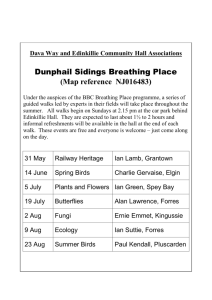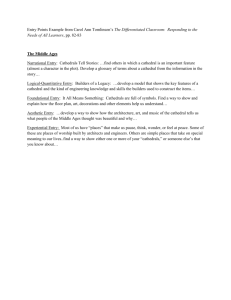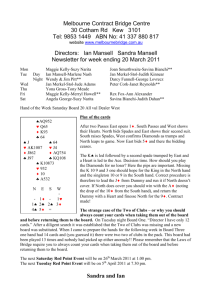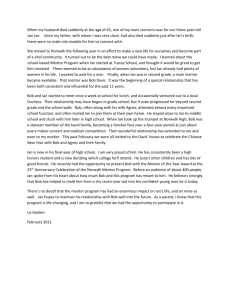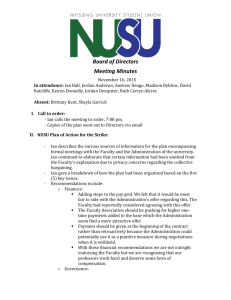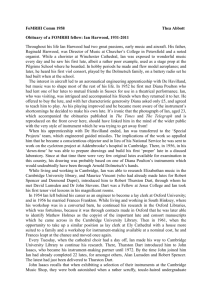Ian Stockton`s Installation
advertisement
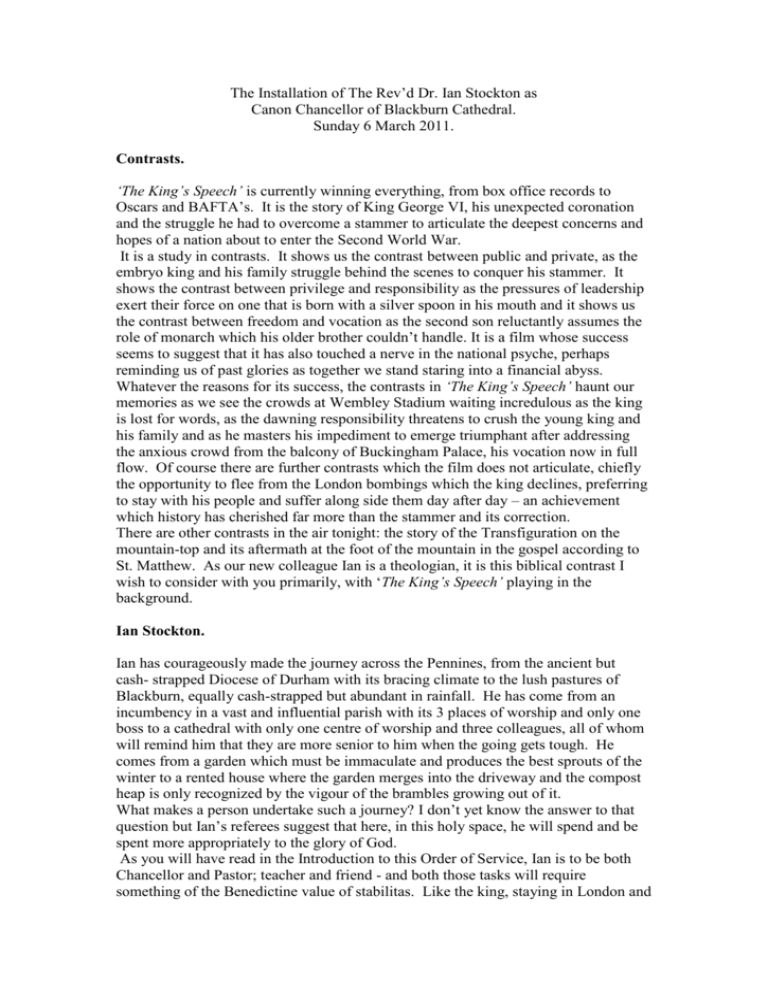
The Installation of The Rev’d Dr. Ian Stockton as Canon Chancellor of Blackburn Cathedral. Sunday 6 March 2011. Contrasts. ‘The King’s Speech’ is currently winning everything, from box office records to Oscars and BAFTA’s. It is the story of King George VI, his unexpected coronation and the struggle he had to overcome a stammer to articulate the deepest concerns and hopes of a nation about to enter the Second World War. It is a study in contrasts. It shows us the contrast between public and private, as the embryo king and his family struggle behind the scenes to conquer his stammer. It shows the contrast between privilege and responsibility as the pressures of leadership exert their force on one that is born with a silver spoon in his mouth and it shows us the contrast between freedom and vocation as the second son reluctantly assumes the role of monarch which his older brother couldn’t handle. It is a film whose success seems to suggest that it has also touched a nerve in the national psyche, perhaps reminding us of past glories as together we stand staring into a financial abyss. Whatever the reasons for its success, the contrasts in ‘The King’s Speech’ haunt our memories as we see the crowds at Wembley Stadium waiting incredulous as the king is lost for words, as the dawning responsibility threatens to crush the young king and his family and as he masters his impediment to emerge triumphant after addressing the anxious crowd from the balcony of Buckingham Palace, his vocation now in full flow. Of course there are further contrasts which the film does not articulate, chiefly the opportunity to flee from the London bombings which the king declines, preferring to stay with his people and suffer along side them day after day – an achievement which history has cherished far more than the stammer and its correction. There are other contrasts in the air tonight: the story of the Transfiguration on the mountain-top and its aftermath at the foot of the mountain in the gospel according to St. Matthew. As our new colleague Ian is a theologian, it is this biblical contrast I wish to consider with you primarily, with ‘The King’s Speech’ playing in the background. Ian Stockton. Ian has courageously made the journey across the Pennines, from the ancient but cash- strapped Diocese of Durham with its bracing climate to the lush pastures of Blackburn, equally cash-strapped but abundant in rainfall. He has come from an incumbency in a vast and influential parish with its 3 places of worship and only one boss to a cathedral with only one centre of worship and three colleagues, all of whom will remind him that they are more senior to him when the going gets tough. He comes from a garden which must be immaculate and produces the best sprouts of the winter to a rented house where the garden merges into the driveway and the compost heap is only recognized by the vigour of the brambles growing out of it. What makes a person undertake such a journey? I don’t yet know the answer to that question but Ian’s referees suggest that here, in this holy space, he will spend and be spent more appropriately to the glory of God. As you will have read in the Introduction to this Order of Service, Ian is to be both Chancellor and Pastor; teacher and friend - and both those tasks will require something of the Benedictine value of stabilitas. Like the king, staying in London and enduring the blitz, a Pastor will be most effective close to those whom he serves, understanding their joys and sorrows and knowing where to find the most appropriate resources, including those of his closest colleagues. Holy Space. Ian has a keen sense of space. Such is his ability that he has been able to transfer that sense of space into the field of theology with evident success. In Blackburn, where place-making is part of the common parlance of the developers who work with us in the regeneration of the town, his contribution to that debate will not go amiss. However, as our 2nd lesson tonight suggests, the greater challenge is for Ian and for all of us to understand how the top of the mountain of Transfiguration relates to the bottom of the mountain and the needs of the broken and needy that gather there. How do we use this holy space to make whole the holy people of God? Bishop John Inge, himself a place-maker, has challenged cathedrals to be sursum cordas – to lift up the hearts through stone. [‘Dreaming Spires’ 2006]. How can the architecture, the art, the liturgy, the community and the ordinary human traffic of this place lift our hearts to God? How does the wonder of the mountain-top transform life at the bottom of the hill? It seems to me that this is one of the most inspired challenges of the recent Episcopal Visitation to this cathedral for it requires the downto-earth pastor to be able to raise our hearts and minds to the glory of God using the skills of the teacher. So often we find ourselves tongue-tied in the presence of both glory and misery. And yet, like ‘The King’s Speech’, we know the words are there somewhere if only we could articulate them. Occasionally, it needs a Logue to come from the other side of the world, or the other side of the country to help us realize what treasures we have here – both human and divine – and to help us articulate them to the glory of God. It is an exciting task and we are convinced that Ian is up to the job for he has served his apprenticeship carefully. One final point, if I may. We have just prayer the Collect for Quinquagesima – that God might ‘pour into our hearts that most excellent gift of charity’. Ian will not be working alone. He joins a team of capable and dedicated colleagues both ordained and lay, all of whom are keen to work together on this joint venture of sursum corda, raising hearts and minds to God. Cathedrals are challenging place in which to live and work. The pressures are intense but their structure is such that we are yoked together. Whilst an archdeacon, a bishop or even a parish priest can often escape the presence of a team, it is impossible in a Cathedral. Cathedrals are testing grounds for the love of God, as are monastic institutions. The latter are currently in decline while cathedrals flourish. Now cathedrals are by no means perfect and when they go wrong it is spectacular but that excellent gift of charity is crucial if we are to deliver what bishop and diocese, church and world want us to deliver. Ian, I hope you and your family will pray that collect with us and for us so that the words might be found and our hearts lifted up to the glory of God, Amen.


